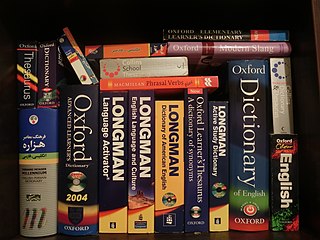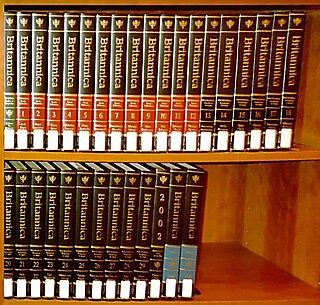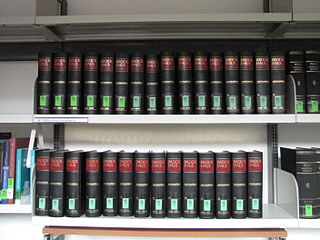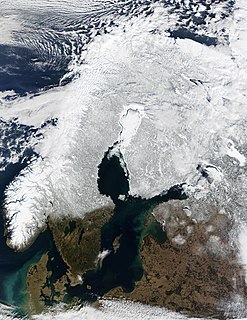
A dictionary is a listing of lexemes from the lexicon of one or more specific languages, often arranged alphabetically, which may include information on definitions, usage, etymologies, pronunciations, translation, etc. It is a lexicographical reference that shows inter-relationships among the data.
In law and government, de jure describes practices that are legally recognized, regardless of whether the practice exists in reality. In contrast, de facto describes situations that exist in reality, even if not legally recognized.

An encyclopedia, encyclopædia, or encyclopaedia is a reference work or compendium providing summaries of knowledge either general or special to a particular field or discipline. Encyclopedias are divided into articles or entries that are often arranged alphabetically by article name and sometimes by thematic categories. Encyclopedia entries are longer and more detailed than those in most dictionaries. Generally speaking, encyclopedia articles focus on factual information concerning the subject named in the article's title; this is unlike dictionary entries, which focus on linguistic information about words, such as their etymology, meaning, pronunciation, use, and grammatical forms.

A reference work is a work, such as a book or periodical, to which one can refer for information. The information is intended to be found quickly when needed. Such works are usually referred to for particular pieces of information, rather than read beginning to end. The writing style used in these works is informative; the authors avoid use of the first person, and emphasize facts.
A thesaurus or synonym dictionary is a reference work for finding synonyms and sometimes antonyms of words. They are often used by writers to help find the best word to express an idea:
...to find the word, or words, by which [an] idea may be most fitly and aptly expressed

An eponym is a person, place, or thing after whom or which someone or something is, or is believed to be, named. The adjectives derived from eponym include eponymous and eponymic.

Merriam-Webster, Inc. is an American company that publishes reference books and is especially known for its dictionaries. It is the oldest dictionary publisher in the United States.

Navy blue is a color in between blue and black.

Urban Dictionary is a crowdsourced online dictionary for slang words and phrases, operating under the motto "Define Your World." The website was founded in 1999 by Aaron Peckham. Originally, Urban Dictionary was intended as a dictionary of slang or cultural words and phrases, not typically found in standard dictionaries, but it is now used to define any word, event, or phrase. Words or phrases on Urban Dictionary may have multiple definitions, usage examples, and tags. As of 2014, the dictionary had over seven million definitions, while around 2,000 new entries were being added daily.

The chairperson is the presiding officer of an organized group such as a board, committee, or deliberative assembly. The person holding the office, who is typically elected or appointed by members of the group, presides over meetings of the group, and conducts the group's business in an orderly fashion.

A company, abbreviated as co., is a legal entity representing an association of people, whether natural, legal or a mixture of both, with a specific objective. Company members share a common purpose and unite to achieve specific, declared goals. Companies take various forms, such as:

A peninsula is a landform surrounded by water on most of its borders while being connected to a mainland from which it extends. The surrounding water is usually understood to be continuous, though not necessarily named as a body of water. A river which courses through a very tight meander is also sometimes said to form a "peninsula" within the loop of water. A peninsula is land with bodies of water on three sides of it.